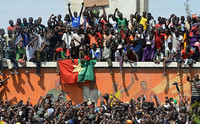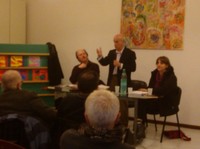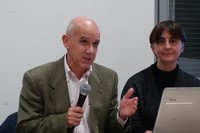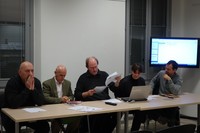Freedom house, press freedom survey 2005
Tunisia
Status: Not Free
Legal Environment: 26
Political Environment: 30
Economic Environment: 24
Total score: 80
Despite the Tunisian government’s professed commitment to democracy, it tightly
controls the media and represses dissent through a highly effective system of legal,
financial, and psychological measures. The constitution guarantees freedom of the press
except under “conditions laid down by law.” The press code stipulates imprisonment and
heavy fines for defamation of government officials and for the dissemination of “false
information,” and all local and foreign publications require a receipt from the
government, called a “depot legal,” before they can be distributed. Authorities simply
decline to issue receipts for publications they deem objectionable.
The print press comprises several large circulation state-owned and private pro-government
papers, and a few small-circulation independent and opposition party-affiliated
publications. Foreign publications are subject to government censors. The
government regularly issues directives on press coverage, and media content is generally bland: open criticism of government policies, and especially of President Zein Al Abdine
Ben Ali, is exceedingly rare and results in a swift repressive response from the
authorities. Nonetheless, some small-circulation papers, such as Al Mawqif, have begun
to cover human rights issues and to publish mild criticism of the government. In advance
of the October 2004 presidential and legislative elections, Tunisian media were
dominated by positive coverage of the President and of pro-government candidates.
Public debate was further muffled by a 2003 amendment to the electoral law that bans
Tunisians from discussing the campaign on foreign broadcasts two weeks before the vote.
Jorunalists are subject to detentions, police surveillance, harassment, and physical assault,
resulting in self-censorship. In January 2004, journalist and human rights activist Sihem
Bensidrine was attacked by unknown assailants; a week later, the authorities again
rejected her application to publish a weekly newspaper, Kalima. In February and March,
the security forces disrupted peaceful demonstrations in Tunis calling for an independent
press.
Security officials vigorously monitor E-mail, conduct surveillance of Internet
cafes, and block websites that publish information critical of the government. In April
2004, after a trial described as deeply flawed by human rights groups, nine young
Tunisians were sentenced to between 19 and 26 years in prison for planning terrorist
attacks after they allegedly viewed “terrorist” websites at an Internet cafe in Zarzis.
(Some of the sentences were later reduced to 13 years on appeal). In 2004, authorities
attempted to prevent former political prisoner and journalist Abdallah Zouari from
accessing the Internet. During the year, international human rights groups protested
Tunisia’s selection as the host of the UN’s November 2005 World Summit on the
Information Society as highly inappropriate, given the country’s dismal record on
freedom of expression and access to information.
The government withholds advertising funds from publications that do not
provide sufficiently favorable coverage. All broadcast media are owned by the
government, with the exception of one private radio station, Radio Mosaique, approved
in 2003, and one private television station, Hannibal TV, launched on a trial basis in
February 2004. Both are owned by supporters of President Ben Ali and, like the state-run
stations, avoid airing viewpoints contrary to official policy. Many foreign satellite
stations can be viewed in Tunisia, although the government blocks France 2 and has
blocked Al Jazeera for their negative coverage of Ben Ali.
Articoli correlati
 Dal nostro corrispondente a Ouagadougou Stefano Dotti:
Dal nostro corrispondente a Ouagadougou Stefano Dotti:Burkina Faso, la gente “fa il vuoto” ai golpisti
18 settembre 2015 - Laura Tussi In diretta dal Forum Sociale Mondiale a Tunisi
In diretta dal Forum Sociale Mondiale a Tunisi"Una riflessione critica sul futuro del Forum Sociale Mondiale" di Vittorio Agnoletto
29 marzo 2015 - Laura Tussi In diretta da Tunisi:
In diretta da Tunisi:"Tunisi: il Social Forum in un Paese che vuole restare normale" di Vittorio Agnoletto
27 marzo 2015 - Laura Tussi

Sociale.network